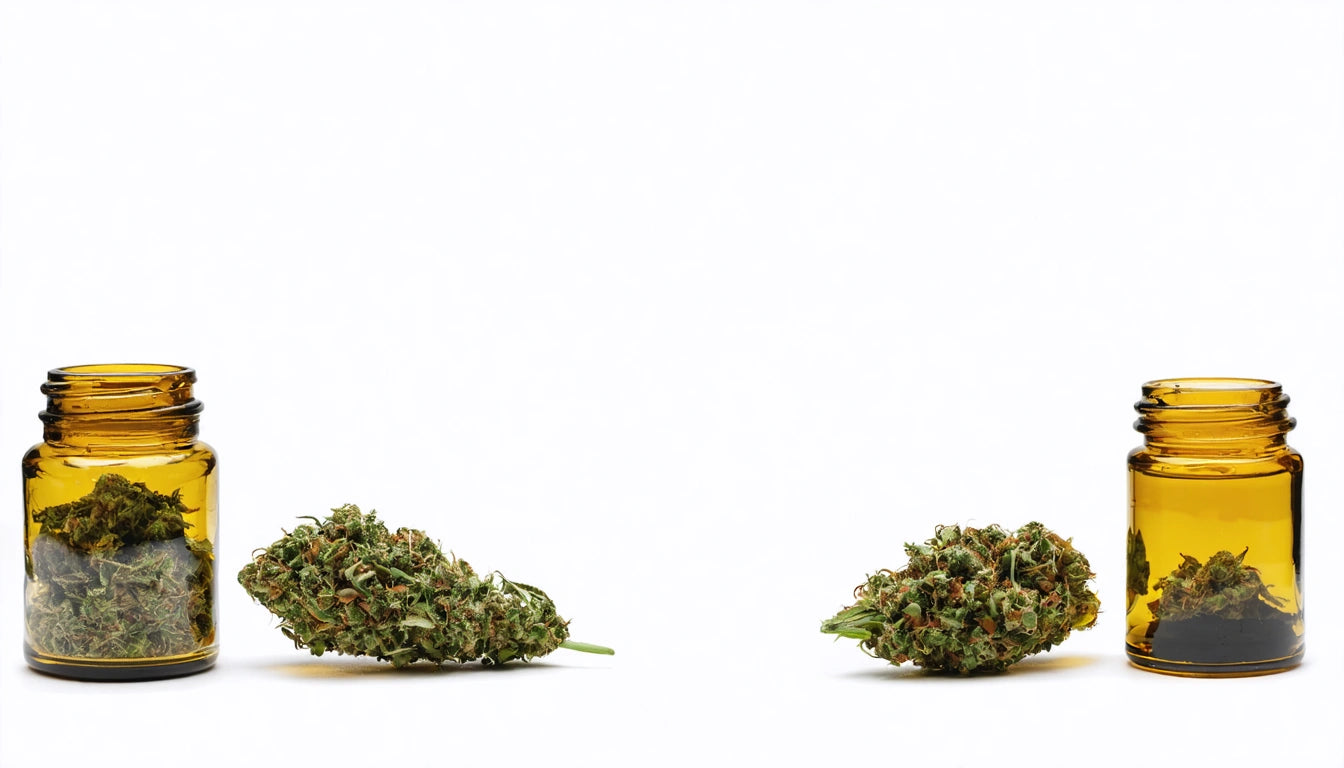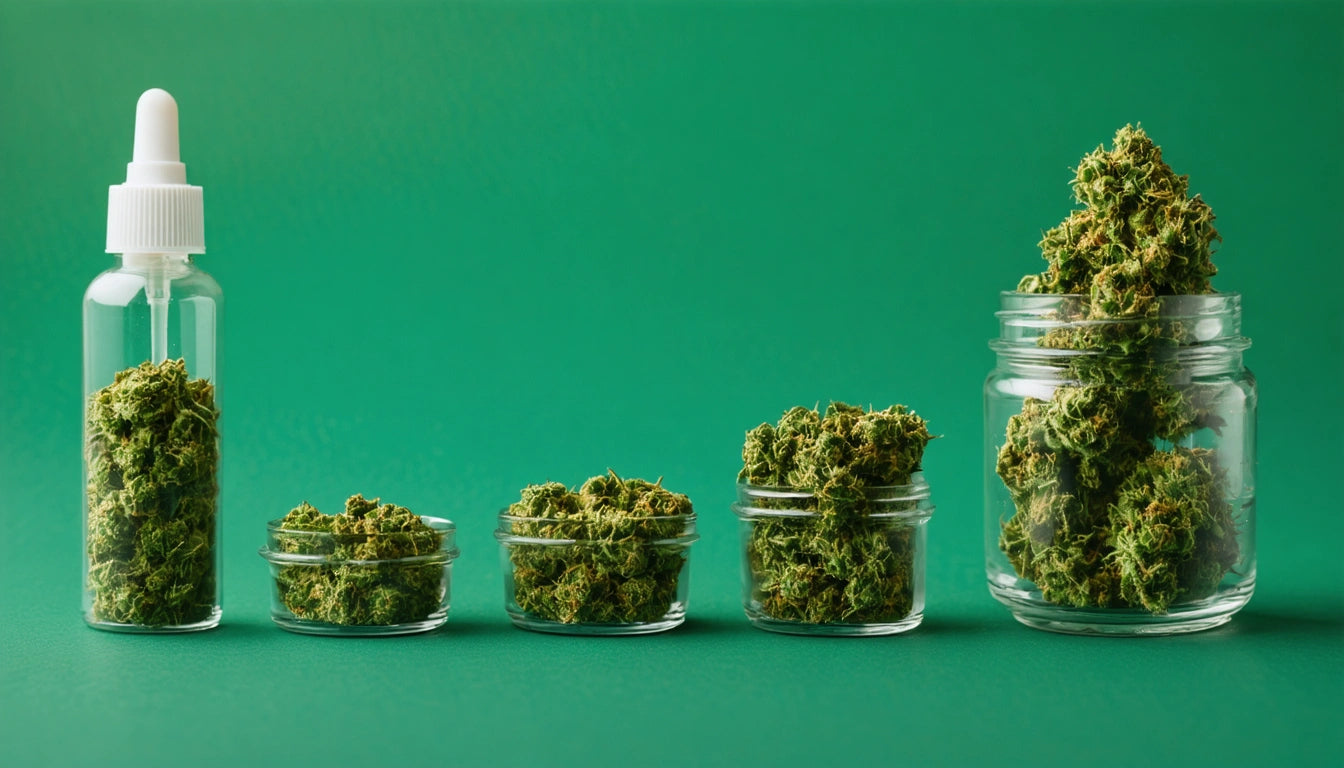Table of Contents
Exploring THCV: Benefits, Uses, and Differences from THC
The cannabis plant contains over 100 cannabinoids, with THC and CBD being the most well-known. However, another compound gaining significant attention is THCV (Tetrahydrocannabivarin). As consumers become more educated about cannabinoids beyond the basics, THCV has emerged as a compound of interest for its unique properties and potential benefits.
What is THCV: The Emerging Cannabinoid
THCV is a minor cannabinoid found in cannabis plants, typically in higher concentrations in certain African sativa strains. Structurally similar to THC (Tetrahydrocannabinol), THCV has a propyl side chain instead of THC's pentyl chain, which significantly alters its effects on the body.
Unlike many cannabinoids that begin as acidic precursors, THCV starts as THCVA (tetrahydrocannabivarinic acid) and converts to THCV when heated through decarboxylation. This process is similar to how THCA converts to THC through heating.
THCV vs THC: Key Differences and Similarities
Chemical Structure
While both THCV and THC interact with the body's endocannabinoid system, they do so differently due to their structural variations. THC has a five-carbon side chain (pentyl), while THCV has a three-carbon chain (propyl). This seemingly small difference creates distinct effects.
Psychoactive Properties
When comparing THC vs THCV, one crucial distinction is their psychoactivity. THC is known for its intoxicating effects, while THCV exhibits different properties:
- At low doses, THCV may actually act as a THC antagonist, potentially blocking some of THC's psychoactive effects
- At higher doses, THCV can produce a clear-headed, stimulating high that's typically shorter in duration than THC
- THCV's high is often described as energizing and alert, compared to THC's sometimes sedating effects
For those interested in understanding different THC types, THCV represents a unique variant with its own distinct properties.
Benefits of THCV: Potential Health Applications
Research into what THCV does for the body has revealed several promising potential benefits:
Appetite Suppression
Unlike THC, which often stimulates appetite (the "munchies"), THCV may actually suppress appetite at certain doses. This makes it potentially valuable for weight management programs.
Blood Sugar Regulation
Early research suggests THCV may help regulate blood sugar levels and improve insulin sensitivity, making it a compound of interest for diabetes research.
Anxiety Reduction
Some studies indicate THCV might reduce anxiety without causing sedation, offering a potential alternative to traditional anti-anxiety medications.
Bone Growth Stimulation
THCV has shown promise in promoting bone cell growth, potentially beneficial for conditions like osteoporosis.
When considering the effects and benefits of cannabinoids, THCV stands out for these unique properties.
THCV for Weight Loss: Research and Evidence
One of the most discussed benefits of THCV is its potential for weight management. Here's what current research suggests about the best THCV for weight loss applications:
- THCV may block the CB1 receptors that trigger hunger signals, potentially reducing overall food intake
- Studies in mice show THCV administration resulted in decreased food intake and weight loss
- Human research is still preliminary but shows promising results for appetite control
- THCV appears to affect energy metabolism, potentially increasing energy expenditure
For consumers seeking cannabis products for specific wellness goals, proper packaging that clearly indicates cannabinoid content is essential. Many producers now use specialized packaging solutions for their cannabis products to highlight THCV content and differentiate these products from standard THC offerings.
How to Use THCV: Products and Consumption Methods
THCV is available in various forms, though not as widely as THC or CBD. Common THCV products include:
THCV-Rich Strains
Some cannabis strains naturally contain higher levels of THCV, including:
- Doug's Varin
- Durban Poison
- Jack the Ripper
- Red Congolese
- Pineapple Purps
THCV Isolates and Extracts
For those seeking THCV without other cannabinoids, isolates and specially formulated extracts are becoming more available in legal markets.
Tinctures and Edibles
THCV-infused tinctures and edibles offer precise dosing options, particularly important when using THCV for specific wellness goals like appetite management.
When exploring vape products containing cannabinoids, some manufacturers now offer THCV-enhanced formulations for consumers seeking its unique effects.
The Future of THCV: Emerging Research and Market Trends
As interest in minor cannabinoids grows, THCV is positioned to become more prominent in both research and commercial applications. Current trends suggest:
- Increasing development of THCV-specific products for weight management
- Growing research into THCV's potential for metabolic disorders
- Rising consumer awareness of cannabinoid profiles beyond THC and CBD
- Expanding cultivation of THCV-rich cannabis strains
Understanding the differences between various cannabinoids will become increasingly important as the cannabis market matures and consumers seek more targeted effects.
THCV represents just one example of how our understanding of cannabis is evolving beyond simple THC content. As research continues and regulatory frameworks develop, we can expect to see more specialized applications of minor cannabinoids like THCV for specific health and wellness goals.











Leave a comment
All comments are moderated before being published.
This site is protected by hCaptcha and the hCaptcha Privacy Policy and Terms of Service apply.